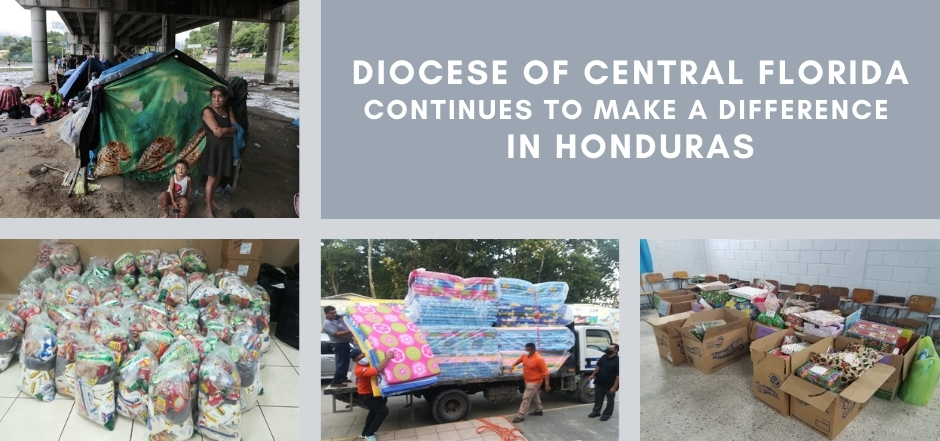The Diocese of Central Florida is still making a difference in the lives of those in the Diocese of Honduras, where not only COVID-19 but Hurricanes Eta and Iota have had devastating impact.
Wesny Dubic, chairman of the diocese’s Honduras Commission, spoke with Bishop Lloyd Allen of the Diocese of Honduras Dec. 22 and reports that Allen wants to share a heartfelt thank-you with the Diocese of Central Florida. “The Episcopal Church in Honduras is making a difference with our help,” Dubic says. “The Diocese of Honduras was able to help and feed quite a lot of people after both hurricanes devastated Honduras, but there is a lot more to be done.”
Dubic also offers his personal thanks to The Rt. Rev. Gregory O. Brewer, diocesan bishop, as well as to the entire diocese for all the help, support and prayers received for Honduras. “Churches throughout Central Florida step up to help our brothers and sisters in the Diocese of Honduras,” he says. “I constantly hear from clergy and laypeople wanting to thank the Diocese of Central Florida. This is a sign that our beloved God is working among us. Thank you!”
Below is a letter Dubic received from Allen Dec. 18 thanking the Diocese of Central Florida for its support.
Dear Bp. Brewer,
First, I wish to thank you for your donation of $20,700. My administrator informed me that transferred monies had arrived from Central Florida yesterday or the day before.
We are providing for people living in shelters whose homes were flooded or damaged by hurricanes Eta-Iota. These shelters are now so crowded that thousands of victims have taken refuge under highway overpasses or bridges, in school or literally on the streets.
Nevertheless, nowhere are the evacuated victims piled up more densely than in the Sula Valley where the city of San Pedro Sula is located, where some neighborhoods are still underwater. The evacuees say they fear that even when they are eventually allowed to return to their flooded neighborhoods, they will find everything gone.
Tomorrow morning at 10:00 we will be taking toys collected by one of our schools, mattresses and food for 62 families living on the borders of Choloma.
“There is a shortage of everything,” Alfonso Martinez said, referring to water, food and medicine. “There is a shortage because, after these two hurricanes, the need is so great.”
The situation also reflects the difficulty of sheltering natural disaster victims amid the coronavirus pandemic. There is no room for social distancing at the school, and few people wear facemasks.
“We are working against COVID,” said Linares, noting, “we give people the material (masks), but then they don’t use it. We have to educate people.”
For the moment, evacuees are much more worried about obtaining necessities, and dreading what they will find when they return to their homes. A member of the community in Choloma who heard about the Episcopal Church helping people came to us asking for assistance. Nelson Roberto Linares, father of five children, has been at the shelter for about two weeks, after Eta and then Iota flooded their neighborhood.
“We have been sleeping on the floor for two weeks, the children are sleeping on the floor,” said Mr. Linares. “We have been forgotten.”
This is true, even though I try to understand that the destruction is so overwhelming that our local and national government does not have the resources to assist every family. Therefore, the churches and NGO’s are chipping in to assist where we can be of help.
Last week I visited communities almost on the border with Guatemala, a community by the name of Cuyamelito. Upon my arrival with a diocesan vehicle filled with bags of food, I met with the local Deacon Jorge Zepeda. I was very upset with him because he was not wearing his face mask and he told me, bishop, we are more about our homes than the coronavirus. “We need roofing sheets,” he said. “These people have no way to get a roof over our heads. He went on to say: “I feel the future is uncertain. They have nothing left. “You work your whole life to be left with nothing.”
“What will we have when we go back? Nothing,” he said.
Bishop Brewer and Wes, this is the reality of the situation in many places and communities in Honduras. I wanted to share these stories with you as we continue helping our brothers and sisters in our surrounding neighborhoods.
Once again, my thanks and appreciation for all you do for us.
Shalom
Bp. +Allen
Dubic adds that there is much more to do and urges people throughout the Diocese of Central Florida to remember those in Honduras in prayer and in gifts over the next several months.

